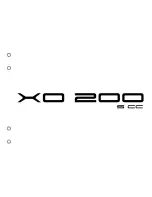
2-2
Section 2
Helm Systems
OS 385
See your Pursuit dealer for necessary con-
trol and cable adjustments. If the starter for
either engine engages with the shift controls
in any position other than neutral, the neutral
safety switch is not functioning properly and
must be repaired before using your boat.
2.4 Neutral Safety Switch
Every control has a neutral safety switch to
prevent the engine from being started while
in gear. Control or cable adjustments must
be performed if the engine will start in for-
ward or reverse.
Test the neutral safety switches periodically
to ensure they are operating. To test the
neutral safety switches; tilt the engines down
and move the shift levers to the forward
position, past first detent. DO NOT advance
past the idle position. Turn the ignition key to
the start position. The starter should not
engage for either engine. Repeat test with
the shift levers in reverse and the engine
throttles at idle, the starter should not
engage for either engine. If an engine starts
in gear during this test, immediately move
the control levers to the neutral position and
turn the engine off. Ejection or sudden loss
of control can occur if an engine can start in
gear and neutral safety switch system does
not function properly.
2.5 Engine Power Tilt and Trim
All outboard engines used on your boat have
a tilt and trim feature. The tilt and trim
switches are usually built into the engine
shift and throttle controls and allow the oper-
ator to control the position of the outboards
from the helm. Moving the gear cases closer
to the boat transom is called trimming “in” or
“down.” Moving the gear cases away from
the boat transom is called trimming “out” or
“up.” In most cases, the boat will perform
best with the outboards adjusted so the hull
will run at a three to five degree angle to the
water.
The term “trim” generally refers to the adjust-
ment of the outboards within the first 20
degree range of travel. This is the range
used while operating your boat on plane.
The term “tilt” refers to adjusting the out-
boards further up for shallow water opera-
tion, trailering or “tilting” the outboards out of
the water. Refer to the engine owner’s man-
ual for information on the proper use and
maintenance of the power tilt and trim.
!
CAUTION
Avoid possible injury or engine dam-
age when shifting:
•
Pause in neutral before shifting
from FORWARD to REVERSE, or
REVERSE to NEUTRAL.
•
DO NOT shift into reverse while the
boat is traveling forward at speed.
•
Keep area around shifter control
clear of obstructions.
!
WARNING
Test the neutral safety switch periodi-
cally. If the switch is not operating
properly, DO NOT use the boat. Con-
tact your Pursuit Dealer and have it
repaired. A neutral safety switch not
operating properly can allow the boat
to start in FORWARD or REVERSE
causing sudden boat movement and
throwing operator and passengers.
!
WARNING
LOSS OF CONTROL AND UNSAFE
BOAT HAZARD
A neutral safety switch that does not
function properly can cause death or
serious injury. DO NOT operate the
boat if the switch does not function
properly.
Summary of Contents for OS 345
Page 2: ......
Page 4: ...Operator Notes OS 375...
Page 16: ...12 Operator Notes OS 385...
Page 32: ...3 6 Operator Notes OS 385...
Page 34: ...4 2 Section 4 Electrical System OS 385 Main Distribution Panel MDP...
Page 54: ...5 8 Operator Notes OS 385...
Page 56: ...6 2 Operator Notes OS 385...
Page 98: ...12 6 Operator Notes OS 385...
Page 104: ...A 6 Operator Notes OS 385...
Page 106: ...B 2 Appendix B Maintenance Log OS 385 Date Hours Dealer Service Repairs Maintenance Log...
Page 107: ...Maintenance Log B 3 Appendix B OS 385 Date Hours Dealer Service Repairs...
Page 108: ...B 4 Appendix B Maintenance Log OS 385 Date Hours Dealer Service Repairs...
Page 109: ...Boating Accident Report C 1 Appendix C OS 385 Boating Accident Report...
Page 110: ...C 2 Appendix C Boating Accident Report OS 385...
Page 111: ...Float Plan D 1 Appendix D OS 385 Float Plan...
Page 112: ...D 2 Operator Notes OS 385...
Page 116: ...E 4 Operator Notes OS 385...
Page 117: ...Schematics F 1 Appendix F OS 385 Schematics...
Page 118: ...F 2 Appendix F Schematics OS 385...
Page 119: ...Schematics F 3 Appendix F OS 385...
Page 120: ...F 4 Appendix F Schematics OS 385...
Page 121: ...Schematics F 5 Appendix F OS 385...
Page 122: ...F 6 Appendix F Schematics OS 385...
Page 123: ...Schematics F 7 Appendix F OS 385...
Page 124: ...F 8 Appendix F Schematics OS 385...
Page 125: ...Schematics F 9 Appendix F OS 385...
Page 126: ...F 10 Appendix F Schematics OS 385...
Page 127: ...Schematics F 11 Appendix F OS 385...
Page 128: ...F 12 Appendix F Schematics OS 385...
Page 129: ...Schematics F 13 Appendix F OS 385...
Page 130: ...F 14 Appendix F Schematics OS 385...
Page 131: ...Schematics F 15 Appendix F OS 385...
Page 132: ...F 16 Appendix F Schematics OS 385...
Page 133: ...Schematics F 17 Appendix F OS 385...
Page 134: ...F 18 Appendix F Schematics OS 385...
Page 135: ...Schematics F 19 Appendix F OS 385...
Page 136: ...F 20 Appendix F Schematics OS 385...
Page 137: ...Schematics F 21 Appendix F OS 385...
Page 138: ...F 22 Appendix F Schematics OS 385...
Page 139: ...Schematics F 23 Appendix F OS 385...
Page 140: ...F 24 Appendix F Schematics OS 385...
Page 141: ...Schematics F 25 Appendix F OS 385...
Page 142: ...F 26 Operator Notes OS 385...
Page 143: ......
Page 144: ......
















































